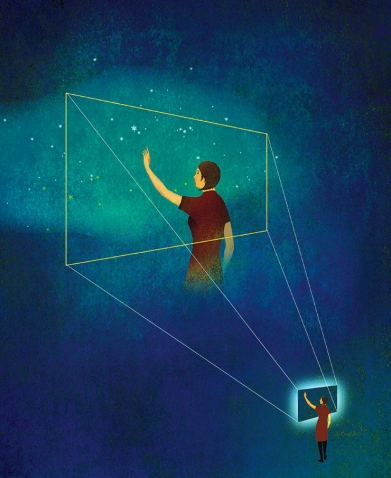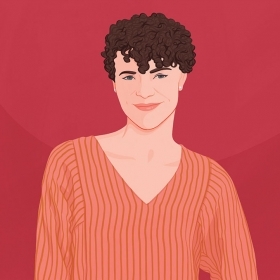Illustration by Brian Stauffer c/o Theispot.com
A few daffodils were beginning to show their color, and students were anticipating spring break. Then, in mid-March, everything changed. The College closed, students were sent home, and faculty were asked to pivot to virtual teaching. Assisted by Library and Technology Services staff, faculty redesigned syllabi; learned Zoom, the online video-conferencing platform; and prepared for a new kind of intellectual engagement in class. They moved online with alacrity: Professor of English Frank Bidart, who before the COVID-19 crisis didn’t even use email, began teaching via Zoom.
James Battat, associate professor of physics, was teaching a lab-only course, PHYS210 Techniques for Experimentalists. He ordered a set of electronics equipment for his students so that they could continue their work remotely. They are completing a set of exercises and taking short videos of their circuits in action to post online. Battat and Katie Hall ’84, distinguished lecturer in physics, host a total of six Zoom sessions per week, and students may participate in any two they choose.
“This has been working really well,” Battat says. “Part of the reason is that during the first part of the semester, we had established a strong rapport with the students, the students had built a strong sense of community with each other and with us, and we had also had time to practice using this kind of equipment in person. This made the transition to remote learning much easier.”
Heather Corbally Bryant, lecturer in the writing program, was teaching her first Calderwood Seminar in Public Writing when the shift happened. “The course examines some of the 21st-century developments in women’s writing,” she says. “Recently the students have branched out into studying … authors [of their own choosing]. Early in the semester, we settled into a lively rhythm and the three-hour-and-10-minute seminar seemed to fly by every week.”
Bryant was concerned about shifting the seminar format online. “I was dubious about how the Calderwood seminar would translate, because it is a course that depends so heavily on interpersonal interaction,” she says. Every week, half the students write and the other half edit. Then they share drafts through Google docs and arrive in class ready to discuss how to improve each piece.
“Though I miss the magic of the classroom, I was thrilled that my students did not miss a beat. They all showed up in our Zoom gallery view ready to engage, to laugh, and to commiserate. Ultimately, they all supported one another wherever they are sheltering in place—from northern Maine to Jamaica,” Bryant says.
A recent assignment had been to write an op-ed piece about the authors they had chosen to study. “But they decided together that they would like, instead, to address the pandemic. Their writing astounded me—we agreed that it was the best writing they had done this semester.”
Daniela Bartalesi-Graf, lecturer in Italian studies, was prepared when the shift happened. For the past six years, she has been developing online Italian courses. “My language class doesn’t use a textbook—only online materials—so the transition was very easy,” she says. For ITAS 102-02, students watch videos, read PDFs, do interactive assignments with immediate feedback, and listen to audio files. Bartalesi-Graf says Zoom has one advantage over in-person instruction. “Using breakout rooms, I can divide students into random groups to work together simultaneously, which is difficult to do in the classroom,” she says.
Katherine Ruffin sent her 14 students in ARTS 222 Print Methods: Typography/Book Arts home with tool kits to continue their hands-on work. “Instead of one fairly complicated final project in the Book Arts Lab and papermaking studio that would have incorporated hand papermaking, letterpress printing, bookbinding, and other techniques, I have given the students a range of eight smaller projects that are based on creating unique artist-made books from materials they have at hand,” she says.
“The students are responding in a variety of ways,” says Ruffin, director of the book studies program and lecturer in art. “I’m appreciative of them sharing their pets, or playing music when we take a five-minute stretch break in the middle of class, or making really kind, supportive comments about their classmates’ work in the chat.”
James Battat says the pivot has been a learning experience. “By going remote, I have been forced to reconsider ‘standard’ pedagogical practices—and have appreciated that challenge. One big take-home message is that faculty are more in tune with some nonacademic burdens that students face outside the classroom, and how there is a large disparity in who faces which challenges. Of course, those disparities have always been present, even when we were teaching in person. So hopefully this experience will help motivate us to reconsider what it means to teach at Wellesley in the face of this landscape of student experiences.”








We ask that those who engage in Wellesley magazine's online community act with honesty, integrity, and respect. (Remember the honor code, alums?) We reserve the right to remove comments by impersonators or comments that are not civil and relevant to the subject at hand. By posting here, you are permitting Wellesley magazine to edit and republish your comment in all media. Please remember that all posts are public.